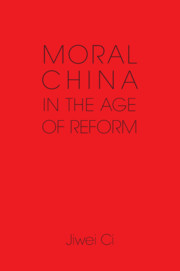Book contents
- Frontmatter
- Dedication
- Contents
- Acknowledgments
- Introduction
- 1 An Anatomy of the Moral Crisis
- 2 Political Order, Moral Disorder
- 3 Freedom as a Chinese Question
- 4 Freedom and Its Epistemological Conditions
- 5 Freedom and Identification
- 6 Neither Devotion Nor Introjection
- 7 The Insult of Poverty
- 8 Democracy as Unmistakable Reality and Uncertain Prospect
- 9 Freedom’s Unfinished Task
- 10 China’s Space of Moral Possibilities
- Index
- References
6 - Neither Devotion Nor Introjection
Published online by Cambridge University Press: 05 September 2014
- Frontmatter
- Dedication
- Contents
- Acknowledgments
- Introduction
- 1 An Anatomy of the Moral Crisis
- 2 Political Order, Moral Disorder
- 3 Freedom as a Chinese Question
- 4 Freedom and Its Epistemological Conditions
- 5 Freedom and Identification
- 6 Neither Devotion Nor Introjection
- 7 The Insult of Poverty
- 8 Democracy as Unmistakable Reality and Uncertain Prospect
- 9 Freedom’s Unfinished Task
- 10 China’s Space of Moral Possibilities
- Index
- References
Summary
1
This chapter is in some ways a summation of everything that has gone before in this book. If Chapters 1 and 2 provide a diagnostic account of the moral crisis in post-Mao China without yet drawing on the apparatus comprising the notion of agency and the distinction between freedom and identification as different configurations of agency, and if Chapters 3–5 supply that apparatus, then this chapter attempts an analysis of the moral crisis against the conceptual backdrop of the distinction between freedom and identification. Instead of directly employing the terms of this distinction, however, I will work with variations upon them, that is, in terms of the contrast between devotion and introjection, between a leader-centered and a superego-centered morality.
This terminological shift is due to the fact that in this chapter I draw heavily on Freud, and the main reason I draw on Freud at this point in my inquiry is that his way of looking at certain things allows me to take a natural next step on the basis of my preceding ones. In particular, Freud’s ideas of the superego and group psychology make it possible for me not only to cast my preceding analysis of the moral crisis in a comparable yet different and enriching framework but also to bring an otherwise largely typological distinction (between freedom and identification) to bear, in a natural way, on what is involved in a possible transition in China today from one type of moral culture to another.
- Type
- Chapter
- Information
- Moral China in the Age of Reform , pp. 108 - 124Publisher: Cambridge University PressPrint publication year: 2014

